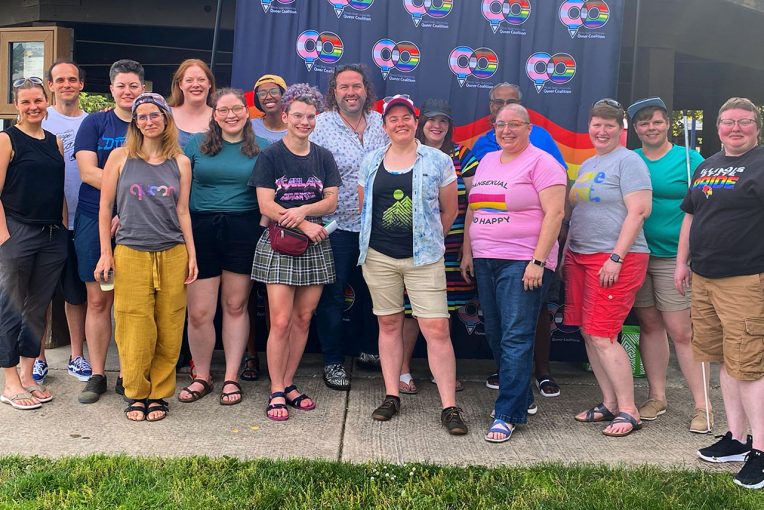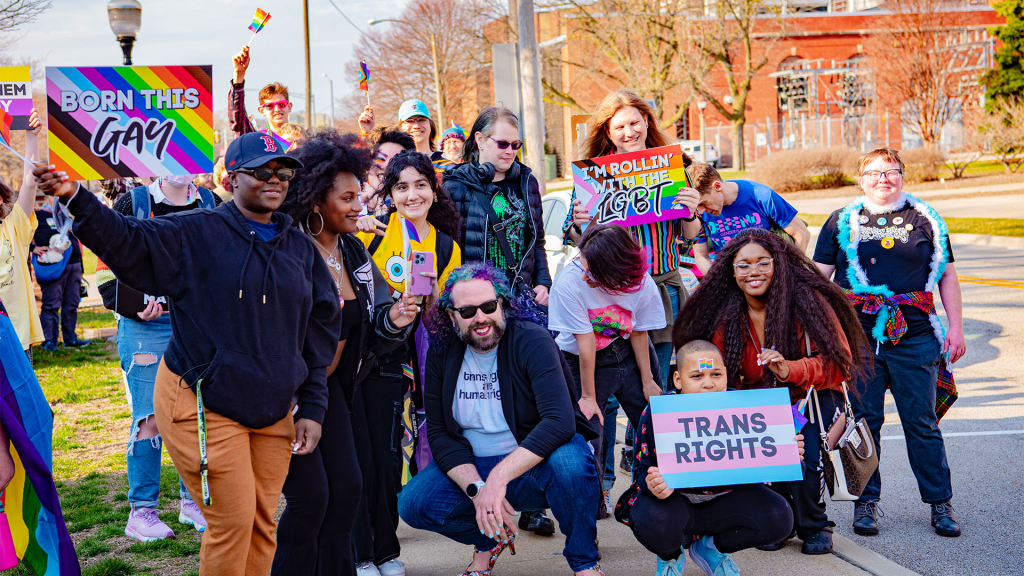Established by a group of Illinois State University faculty and staff as a support system for the LGBTQIA2S+ community, Queer Coalition (QC) stands as an emblem of inclusion and unity on the University’s campus.
Approaching the organization’s third year, Queer Coalition is an LGBTQIA2S+ faculty, staff, and graduate student affinity group at Illinois State, which aims to provide opportunities for community building, solace, and networking, according to Dr. Gavin Weiser, an assistant professor in the Department of Educational Administration and Foundations and QC’s outgoing co-president. QC also strives to foster equity and inclusion across the University community.
Now a well-established organization with nearly 200 members, QC has been years in the making.
Creating Queer Coalition
When Prairie Pride Coalition President Dave Bentlin ’88, ’92, moved to Bloomington-Normal in the fall of 1980, he said resources and organizations for the LGBTQ+ community were extremely limited.
In the early 2000s, Bentlin, along with other local LGBTQ+ advocates including Barb Dallinger ’81, M.S. ’01, and Michael D. Schermer ’73, M.S. ’78, became involved with the Triangle Association—a group of LGBTQ+ faculty, staff, and supporters who gathered once a month for social activities and educational sessions. However, Bentlin said it was difficult for the organization to get a foothold.
“It was during a time the University was not familiar with employee resource groups likes ours,” Bentlin said. “I don’t know if they knew quite what to do with us. For a long time, there was an environment of benign heteronormativity—there were both general and minimal support for LGBTQ+ faculty and staff on campus.”
When Weiser arrived at Illinois State in 2018, they discovered the existing Triangle Association and LGBT/Queer Studies and Services Institute, and they, along with Bentlin, Dallinger, Dr. Livia Stone, an associate professor of sociology and anthropology, University Archivist April Anderson-Zorn, and Head of Technical Services at Milner Library Eric Willey suggested combining the two organizations into one.
“We wanted to be a point of connection between Pride (a registered student organization), and the faculty/staff organization, and we also wanted to be something the administration could use as a resource when it was facing some questions or difficulties,” said Stone, who has served on the QC and LGBT/Queer Studies and Services Institute boards.
Bentlin, Dallinger, Stone, and Weiser united to form a new organization in 2020 along with Dr. Byron Craig, an assistant professor in the School of Communication, and Karmine Beecroft, a digitization coordinator with Milner Library who is QC’s incoming president.
“Byron and I shared some really great ideas about events that we could do to highlight and support the LGBTQ+ community on campus,” said Weiser. “A small group of us started meeting, discussing the group’s name and writing bylaws and constitutions to form this. We were building the plane as it went.”
In January 2021, QC held its first election, and Craig and Weiser were elected co-presidents.
Bentlin said he is pleased by the progress made by QC and other community organizations since he first arrived in town more than 40 years ago.
“This community, in large part because of Illinois State University, has become a more progressive environment and has been a place where people can be themselves and live openly,” said Bentlin.
Queer Coalition today
Now 195 members strong, QC hosts frequent gatherings and informational sessions throughout the year, including brown bag chats, a hike at Comlara Park on July 22, tabling at Pridefest in Downtown Bloomington on July 29, and more.
QC has hosted several events this year including the Transgender Day of Visibility Sashay march through Uptown Normal, an annual Pride Picnic, and a Lunch and Learn series. QC members are also active in community events and participate in university administrative meetings.

QC and four other faculty/staff affinity organizations, serve on the President’s Diversity and Inclusion and Advisory Council (DIAC), which works toward a more diverse, equitable, inclusive, and socially just university.
“We’re here. We provide opportunities for socialization, education, community building, and information sharing,” said Beecroft. “We’re going to keep having conversations with university leadership by pointing out areas for improvement and offering suggestions on how to get there.”
Bentlin said he’s particularly proud of the LBGTQ+ Student Support Endowment, created during the Triangle Association’s era and carried forward by QC, which provides students with emergency financial assistance.
“Students were able to stay in school because of financial support,” Bentlin said. “It really is a legacy of the Triangle Association, and I know that Queer Coalition has adopted it well and takes a very active role in the fund.”
The future of Queer Coalition
Beecroft, who becomes QC’s president on July 1, is focused on continuing to grow the organization. In partnership with Pride, Beecroft hopes to launch a mentorship program this fall to provide resources and guidance to members of the LGBTQIA2S+ community who are coming out or feeling pessimistic about their futures.
“This is an opportunity for our members who have gone through a lot of those same things and have jumped those hurdles to share their experiences and emotions, so the students feel like they are not alone and that there’s a future for them,” said Beecroft.
Individuals who are interested in joining QC can fill out a membership form and attend an open meeting via Zoom.
Beecroft said being a part of QC has given them the ability to influence institutional change while also making friends within Illinois State’s LGBTQIA2S+ community.
“I really like being able to give back to this community, push some of the changes that I felt frustrated about in other positions, and have the ability to make an impact,” Beecroft said. “I met a bunch of awesome people along the way.”
Bentlin, who retired from a 37-year career at the University last year, said he’s proud to see a new generation of LGBTQIA2S+ champions take charge.
“It’s been rewarding to see a younger generation of faculty and staff members step forward who are so passionate about that work because people like Barb (Dallinger) and myself are retired,” said Bentlin. “I think the people like Gavin, Byron, and Karmine have done that. I feel good about what they’re doing and know they’re trying to get good results.”



